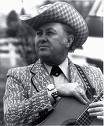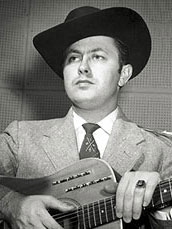Jimmy Martin Biography

Born James H. Martin in Sneedville, Tennessee. His mother and step-father who used to sing gospel were his first influences. In his teens, he played guitar in a local string band and later appeared with "Tex Climer and the Blue Band Coffee Boys" on radio.
In the winter of 1949, Mac Wiseman had just left Bill Monroe's "Bluegrass Boys". Martin, who wanted to apply for the vacant post as guitarist, rode the bus into Nashville. He sneaked in backstage at the Opry. While picking his guitar, he was overheard by "Bluegrass Boys" banjo player Rudy Lyle who brought him forward and presented him to Monroe. Martin sang two songs with Monroe and was hired instantly.
Beginning in 1949 Martin was lead vocalist for Bill Monroe's "Bluegrass Boys,". Martin's high voice mixed with Monroe's tenor came to be known as the "high lonesome" sound. His influence radically changed Monroe's music from the fast-paced but smooth style of the "original" 1945 band with Flatt and Scruggs. Martin challenged Monroe to raise the pitch on many of his classics and to write new, "lonesome" songs. This band with Rudy Lyle (banjo) and Charlie Cline (fiddle) was one of the many high points of Monroe's career. Martin's lead was defining in "lonesome" songs such as "Sitting Alone in the Moonlight", "Memories of Mother and Dad" and "I'm Blue, I'm Lonesome".
Martin had a famously high-strung and exuberant personality, and inevitably clashed with Monroe's equally stubborn temperament. He left Monroe and worked briefly with the Osborne Brothers until he formed his own band, "The Sunny Mountain Boys" in 1955. The classic lineup of this band, with J. D. Crowe and "Big" Paul Williams (stage name for Paul Humphries) defined his "Good 'n Country" style, a commercially-oriented, crowd-pleasing bluegrass with simple harmonies, catchy melodies, and a strong rhythm propelled by Martin's simple but effective guitar playing. He credited himself with inventing the "G" run- a guitar lick used widely in the bluegrass genre. However, aural evidence from the period before Martin began performing professionally clearly shows Lester Flatt using this run when backing Bill Monroe.
Three important components of Martin's unique sound, besides his cutting tenor voice, were tight trio singing, sometimes a female high-baritone fourth part, and the use of a snare drum in place of mandolin to keep the back-beat.
Among Martin's biggest hits of the 1960s were "Hit Parade of Love", "Sophronie", "Stepping Stones", "Tennessee", and "Widow Maker" (a popular truck driver's song). His instrumentals (with the Sunny Mountain Boys) such as "Theme Time", "Bear Tracks" and "Red Rooster" featured ultra-crisp playing by a series of banjo players including Sam "Porky" Hutchins, J.D. Crowe, and Bill Emerson, and powered by Martin's guitar runs, set a standard for bluegrass instrumentals that was highly influential.
Martin was famous as a dangerously unpredictable but highly entertaining stage presence. He freely acknowledged his problems with drinking and volatile mood swings, which kept him from realizing his life-long dream of joining the Grand Ole Opry.
He made frequent appearances on the Louisiana Hayride and the Wheeling Jamboree, as well as the Grand Ole Opry, but was never invited to join the latter.
He performed on the Nitty Gritty Dirt Band's 1971 album, Will the Circle be Unbroken. In 1995, he was inducted into the International Bluegrass Music Hall of Honor. A documentary on his life, King of Bluegrass: The Life and Times of Jimmy Martin, was released in 2003. Martin is also featured in High Lonesome.
Martin's hobby was raccoon-hunting with dogs; he famously featured his hunting dogs on the covers of several LP albums and wrote songs celebrating their prowess.
Jimmy Martin died Saturday May 14, 2005 in Nashville, Tennessee after having been diagnosed with bladder cancer more than a year earlier. He is interred in the Spring Hill Cemetery in Madison, Tennessee.
His trials and tribulations with the Nashville music industry establishment are memorialized in "The Death of Jimmy Martin", a song by Tom Russell on "The Wounded Heart of America" album.



